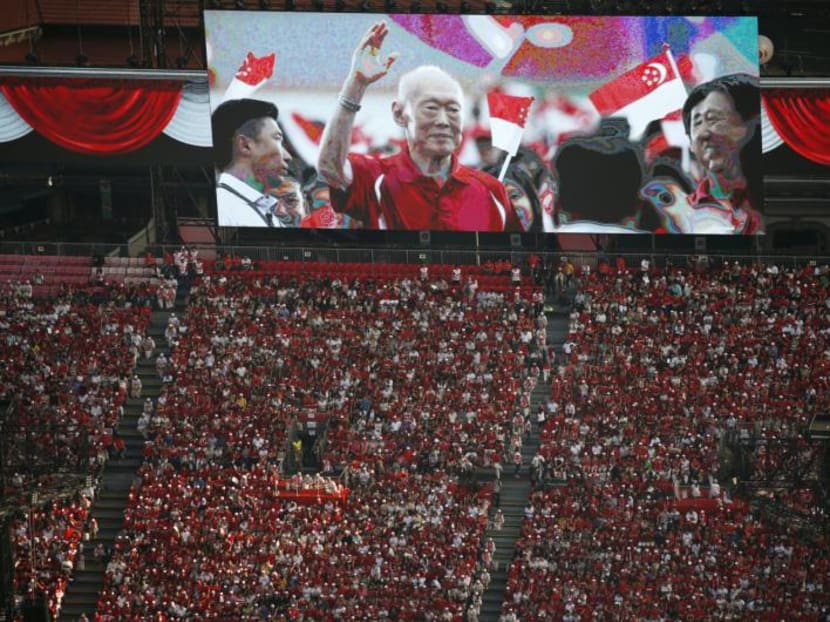Lee Kuan Yew could have ended Thailand’s divide, Prayut says
BANGKOK — The deeply entrenched political divisions in Thailand could have been solved by the late Lee Kuan Yew, who transformed Singapore from slums to skyscrapers in just half a century, Thai Prime Minister Prayut Chan-o-cha said yesterday (Aug 11).

A video tribute of former prime minister Lee Kuan Yew is played during a Golden Jubilee celebration parade rehearsal in Singapore August 1, 2015. Photo: Reuters
BANGKOK — The deeply entrenched political divisions in Thailand could have been solved by the late Lee Kuan Yew, who transformed Singapore from slums to skyscrapers in just half a century, Thai Prime Minister Prayut Chan-o-cha said yesterday (Aug 11).
“If the former prime minister of Singapore had lived in (and run) Thailand, Thais would have stopped fighting a long time ago,” General Prayut told reporters as he compared the great success of the city state to the recurring conflicts among Thais over the past two centuries.
“Thais are like balloons that have long been let go, but those in Singapore have been gradually loosened until everything is in order with progress and modernity in a period of just 50 years,” said the junta leader who spent less than 24 hours in Singapore on Sunday to join other South-east Asian leaders in celebrating the 50th anniversary of its independence.
Impressed by Singapore’s fancy fighter jets and tanks at its national day parade, Gen Prayut said polarised Thailand does not possess national unity like the city state does as rival factions in the kingdom keep fighting and trade corruption allegations, especially over arms procurements.
“Singapore has taken 50 years ... to become one nation that has one of the world’s leading economies,” despite a racial mix of Chinese, Malays and Indians, Gen Prayut told reporters when asked to comment on his impression of the celebrations he attended on Sunday night.
Gen Prayut, who overthrew the democratically elected civilian prime minister Yingluck Shinawatra in the May 2014 coup, has promised to restore peace and stability to Thailand as well as unity.
As his military-appointed government faces a sluggish economy and falling popularity, the regime leader says he has been preoccupied with criticism from the media and politicians.
“Thailand passed that stage a long time ago ... if Thais won’t join hands ... we continue to bicker, we will be way behind them,” Gen Prayut said.
An acrobatic team of F-16 fighter jets and an A-380 commercial plane fresh in his memory as part of the independence anniversary celebrations, Gen Prayut hailed Singapore for having built a strong armed forces with modern armaments to defend its resources and to protect its economic leadership in the region.
“Weapons are meant to keep the country safe ... weapons are not meant for war, but meant to create cooperation,” Gen Prayut said as his government last month suspended a 36-billion-baht (S$1.43-billion) plan to buy three Chinese-made submarines amid a public outcry on overspending as the economic slowdown intensifies.
Singapore, one of the world’s most militarised countries, showed off its military firepower on Sunday with a flypast by fighter jets in a formation spelling out “50”.
Singapore’s per-capita military expenditure is one of the highest in the world. According to the Stockholm International Peace Research Institute (Sipri), a Singaporean forked out US$1,789 (S$2,508) on defence spending last year versus US$1,891 by an American and US$85.30 by a Thai.
Singapore’s military expenditure as a percentage of GDP was also the highest in South-east Asia, at 3.3 per cent last year versus 1.5 per cent for Thailand and 0.8 per cent for Indonesia, the Swedish think tank found.
Gen Prayut said the Thai military could not afford to buy new weapons as fears of corruption plagued all procurements. “How can individuals benefit from such procurements when they are done between governments? There is no way such money would go into someone else’s pocket,” he said.
According to Sipri, Thailand’s military spending rose to 102 billion baht in 1997 when the Asian Financial Crisis began and slumped to 75.7 billion baht in 2000 before gradually rising to 122 billion in 2007 and peaking at 186 billion baht last year. BANGKOK POST






